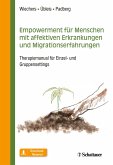- Gebundenes Buch
- Merkliste
- Auf die Merkliste
- Bewerten Bewerten
- Teilen
- Produkt teilen
- Produkterinnerung
- Produkterinnerung
This book uses a post-modern approach to explore how Japanese returnee students (kikokushijo) and former returnees who work in Japanese industry, negotiate multiple identities. Methodological triangulation is used to study inner perception of face, emotional state and the dynamics of negotiating multiple-layering of identities. The work considers the relationship between face and identities, and the function of the affective aspects of face, shame and pride in identity negotiation.
Readers will discover how Japanese returnees deal with shame and pride in face-threatening or face-promoting…mehr
Andere Kunden interessierten sich auch für
![Negotiating multiple identities Negotiating multiple identities]() Kiyoko SuedaNegotiating multiple identities37,99 €
Kiyoko SuedaNegotiating multiple identities37,99 €![Gefangen in der Gesellschaft - Alltagsrassismus in Deutschland Gefangen in der Gesellschaft - Alltagsrassismus in Deutschland]() Dileta Fernandes SequeiraGefangen in der Gesellschaft - Alltagsrassismus in Deutschland29,95 €
Dileta Fernandes SequeiraGefangen in der Gesellschaft - Alltagsrassismus in Deutschland29,95 €![Migration und seelische Gesundheit Migration und seelische Gesundheit]() Hans-Jörg Assion (Hrsg.)Migration und seelische Gesundheit54,99 €
Hans-Jörg Assion (Hrsg.)Migration und seelische Gesundheit54,99 €![Rassismussensible Beratung und Therapie von geflüchteten Menschen Rassismussensible Beratung und Therapie von geflüchteten Menschen]() Eben LouwRassismussensible Beratung und Therapie von geflüchteten Menschen17,00 €
Eben LouwRassismussensible Beratung und Therapie von geflüchteten Menschen17,00 €![Globale Krisen in der Psychotherapie Globale Krisen in der Psychotherapie]() Fabian ChmielewskiGlobale Krisen in der Psychotherapie35,00 €
Fabian ChmielewskiGlobale Krisen in der Psychotherapie35,00 €![Wer ist ein Flüchtling? Wer ist ein Flüchtling?]() Albert ScherrWer ist ein Flüchtling?17,00 €
Albert ScherrWer ist ein Flüchtling?17,00 €![Empowerment für Menschen mit affektiven Erkrankungen und Migrationserfahrungen Empowerment für Menschen mit affektiven Erkrankungen und Migrationserfahrungen]() Maren WiechersEmpowerment für Menschen mit affektiven Erkrankungen und Migrationserfahrungen27,00 €
Maren WiechersEmpowerment für Menschen mit affektiven Erkrankungen und Migrationserfahrungen27,00 €-
-
-
This book uses a post-modern approach to explore how Japanese returnee students (kikokushijo) and former returnees who work in Japanese industry, negotiate multiple identities. Methodological triangulation is used to study inner perception of face, emotional state and the dynamics of negotiating multiple-layering of identities. The work considers the relationship between face and identities, and the function of the affective aspects of face, shame and pride in identity negotiation.
Readers will discover how Japanese returnees deal with shame and pride in face-threatening or face-promoting situations that affect their identity negotiation. Many such returnees stayed abroad because of their parents' jobs and the author explores variations among them, in terms of how they identify with their identity as a returnee. We discover how there are multiple levels of identities instead of 'identity' as a singular.
Two phases of research, carried out across ten years and involving some participants in both phases, are explored in this work. Although the participants in the research are Japanese returnees, the findings drawn from the study have implications for others who spend an extensive period of time overseas, who migrate from one place to another or who have multiple cultural backgrounds.
The book incorporates ideas from Western and Eastern literature on intercultural communication, sociology and social psychology and it blends both micro and macro analysis.
This book is recommended for scholars, educators, students and practitioners who seek to understand better how people negotiate their multiple identities in this globalising world.
Readers will discover how Japanese returnees deal with shame and pride in face-threatening or face-promoting situations that affect their identity negotiation. Many such returnees stayed abroad because of their parents' jobs and the author explores variations among them, in terms of how they identify with their identity as a returnee. We discover how there are multiple levels of identities instead of 'identity' as a singular.
Two phases of research, carried out across ten years and involving some participants in both phases, are explored in this work. Although the participants in the research are Japanese returnees, the findings drawn from the study have implications for others who spend an extensive period of time overseas, who migrate from one place to another or who have multiple cultural backgrounds.
The book incorporates ideas from Western and Eastern literature on intercultural communication, sociology and social psychology and it blends both micro and macro analysis.
This book is recommended for scholars, educators, students and practitioners who seek to understand better how people negotiate their multiple identities in this globalising world.
Produktdetails
- Produktdetails
- Verlag: Springer / Springer Nature Singapore / Springer, Berlin
- Artikelnr. des Verlages: 978-981-287-007-0
- 2014
- Seitenzahl: 204
- Erscheinungstermin: 19. Mai 2014
- Englisch
- Abmessung: 241mm x 160mm x 17mm
- Gewicht: 420g
- ISBN-13: 9789812870070
- ISBN-10: 9812870075
- Artikelnr.: 40464049
- Verlag: Springer / Springer Nature Singapore / Springer, Berlin
- Artikelnr. des Verlages: 978-981-287-007-0
- 2014
- Seitenzahl: 204
- Erscheinungstermin: 19. Mai 2014
- Englisch
- Abmessung: 241mm x 160mm x 17mm
- Gewicht: 420g
- ISBN-13: 9789812870070
- ISBN-10: 9812870075
- Artikelnr.: 40464049
Kiyoko Sueda (Ph.D., Lancaster University, 2002) is professor of communication studies and is currently Chair of the Department of International Communication, School of International Politics, Economics and Communication, Aoyama Gakuin University in Tokyo, Japan. She teaches communication theories, interpersonal communication, intercultural communication, and intercultural training. Her research interests include face (social), identities, shame and pride in interpersonal and intercultural communication. She has written on face, identities, reintegration of shame, communication theories, intercultural communication, and methodologies and methods in communication studies. Her co-authored book, 'Komyunikeishon gaku: Sono tenboh to shiten (Communication studies: Perspectives and prospects)' is one of the best sellers among textbooks on communication studies in Japan. Her co-edited book, 'Komyunikeishon kenkyu hoh (Research methods in communication studies)' was nominated by the Communication Association of Japan as the most outstanding book published in 2011. She has served SIETAR Japan as Vice President from 1998-2001 and 2002-2004, and has served SIETAR Japan and Intercultural Education Society, Japan, as a member of editorial board. She is also engaged in the activities of the Human Dignity and Humiliation Studies organisation and has served as a Global Advisory Board member since 2005.
Forward.- Preface.- Table of Contents.- List of tables.- List of figures.- List of abbreviations.- Chapter 1: Multiple Identities.- 1.1: Purpose of Chapter 1.- 1.2: Identity as singular.- 1.3: Identities as plural, viewed from Symbolic Interactionism.- 1.4: Identities viewed from Social Identity Theory and Self-Categorization theory.- 1.4.1: Background of the theories.- 1.4.2: An overview of the theories.- 1.4.3: Levels of identities.- 1.4.4: The relationship between social identity and personal identity.- 1.4.5: Categories and intergroup behaviours.- 1.5: Negotiation of multiple identities.- 1.6: Summary.-References.- Chapter 2: Research on face in communication studies.- 2.1: Purpose of Chapter 2.- 2.2: The perception of face.- 2.3: Research on face in communication studies.- 2.4: The origin of face.- 2.4.1: Chinese face.- 2.4.2: Japanese face.- 2.5: Summary and implications.- References.- Chapter 3: Shame and pride behind face.- 3.1: Purpose of Chapter 3.- 3.2: Emotions in this study.- 3.2.1: Emotions and sociological theory.- 3.2.2: Emotion as a symbolic interaction.- 3.3: Face and emotions.- 3.3.1: Shame and pride.- 3.3.2: Reintegration of shame.- 3.3.3: Shame and pride illustrated in case studies.- 3.4: Research questions.- 3.4.1: Relationship between face and identities.- 3.4.2: Function of shame and pride in identity negotiation.- 3.5: Summary.- References.- Chapter 4: Japanese returnees (Kikokushijo) as a social category.- 4.1: Purpose of Chapter 4.- 4.2: Japanese returnees as a social category.- 4.2.1: 'Uniqueness' of Japanese returnees.- 4.2.2: Factors contributing to make Japanese returnees a social category.- 4.3: Overview of research on Japanese returnees.- 4.3.1: The background of kikokushijo.- 4.3.2: A historical review of research trends.- 4.4: Japanese returnees' readjustment to Japanese society.- 4.4.1: Returnees' identity and symbolic interactionism.- 4.4.2: Psychological process of readjustment.- 4.5: The public image ofJapanese returnees.- 4.5.1: How returnees are viewed by their peers and teachers.- 4.5.2: How returnees are portrayed by mass media.- 4.6: Conclusion.- References.- Chapter 5: Research methodology and methods.- 5.1 Purpose of Chapter 5.- 5.2: Epistemological and methodological standing.- 5.2.1: Epistemological approach.- 5.2.2: Methodological approach.- 5.3: Methods.- 5.3.1: The methods used in the present research.- 5.3.2: The 'Who am I?' test.- 5.3.3: The PAC (Personal Attitude Construct) method.- 5.3.4: Participant observation.- 5.4: The research participants and procedures.- 5.4.1: The participants in the research.- 5.4.2: The research procedures.- 5.5: The ethical issues concerned.- References.- Chapter 6: Results (The 1st phase of research): Japanese returnees at university.- 6.1: Purpose of Chapter 6.- 6.2: The first phase of research.- 6.2.1: The participants.- 6.2.2: The format of the report.- 6.3: Participant A.- 6.3.1: The WAI and the PAC: A as a Japanese.- 6.3.2: Analysis from the interview with #A.- 6.3.3: Participant observation.- 6.3.4: Conclusion.- 6.4: Participant B.- 6.4.1: The WAI and the PAC: #B as kuroko.- 6.4.2: Analysis from the interview with #B.- 6.4.3: Participant observation.- 6.4.4: Conclusion.- 6.5: Participant C.- 6.5.1: The WAI and the PAC: #C as #C.- 6.5.2: Analysis from the interview with #C.- 6.5.3: Participant observation.- 6.5.4: Conclusion.- 6.6: Conclusion.- References.- Chapter 7: Results (The 2nd phase of research): Japanese former returnees in industry.- 7.1: Purpose of Chapter 7.- 7.2: Research Process.- 7.2.1: Research period and the participants of the second phase of research.- 7.2.2: Research methods and the format of the report.- 7.3: Participant #C.- 7.3.1: Profile of participant #C.- 7.3.2: Semi-structured interview.- 7.4: Participant #D.- 7.4.1: The WAI and the PAC: A as Japanese.- 7.4.2: Analysis from the interview with #D.- 7.4.3: Participant observation.- 7.4.4: Conclusion.- 7.5: Participant #E.- 7.5.1: TheWAI and the PAC: A as a new student.- 7.5.2: Analysis from the interview with #E.- 7.5.3: Participant observation.- 7.5.4: Conclusion.- 7.5.5: The follow-up interview.- 7.6: Participant #F.- 7.6.1: The WAI and the PAC: A as a woman.- 7.6.2: Analysis from the interview with #F.- 7.6.3: Participant observation.- 7.6.4: Conclusion.- 7.7: Conclusion.- References.- Chapter 8: Face (mentsu), shame and pride in identity negotiation.- 8.1: Purpose of Chapter 8.- 8.2: Analysis of the results of the research.- 8.2.1: Threatened face (mentsu) and reinforcement of identities.- 8.2.2: Threatened face and bypassed shame.- 8.2.3: Absence of shame and identity.- 8.2.4: English as a symbol and identity.- 8.2.5: Concern for the other's shame.- 8.2.6: Wiping off shame and restoring pride.- 8.2.7: Co-existing face needs and their interactions.- 8.3 Conclusion.- 8.3.1: The role of shame and pride in negotiating multiple identities.- 8.3.2: The relationship between face and identities.- 8.3.3: Co-existence of multiple face needs and the interactions among them.- 8.3.4: English as a symbol of returnees and former returnees.- 8.3.5: Methodological contribution.- 8.4: Further work.- 8.5: Summary.- References.- Subject index.
Forward.- Preface.- Table of Contents.- List of tables.- List of figures.- List of abbreviations.- Chapter 1: Multiple Identities.- 1.1: Purpose of Chapter 1.- 1.2: Identity as singular.- 1.3: Identities as plural, viewed from Symbolic Interactionism.- 1.4: Identities viewed from Social Identity Theory and Self-Categorization theory.- 1.4.1: Background of the theories.- 1.4.2: An overview of the theories.- 1.4.3: Levels of identities.- 1.4.4: The relationship between social identity and personal identity.- 1.4.5: Categories and intergroup behaviours.- 1.5: Negotiation of multiple identities.- 1.6: Summary.-References.- Chapter 2: Research on face in communication studies.- 2.1: Purpose of Chapter 2.- 2.2: The perception of face.- 2.3: Research on face in communication studies.- 2.4: The origin of face.- 2.4.1: Chinese face.- 2.4.2: Japanese face.- 2.5: Summary and implications.- References.- Chapter 3: Shame and pride behind face.- 3.1: Purpose of Chapter 3.- 3.2: Emotions in this study.- 3.2.1: Emotions and sociological theory.- 3.2.2: Emotion as a symbolic interaction.- 3.3: Face and emotions.- 3.3.1: Shame and pride.- 3.3.2: Reintegration of shame.- 3.3.3: Shame and pride illustrated in case studies.- 3.4: Research questions.- 3.4.1: Relationship between face and identities.- 3.4.2: Function of shame and pride in identity negotiation.- 3.5: Summary.- References.- Chapter 4: Japanese returnees (Kikokushijo) as a social category.- 4.1: Purpose of Chapter 4.- 4.2: Japanese returnees as a social category.- 4.2.1: ‘Uniqueness’ of Japanese returnees.- 4.2.2: Factors contributing to make Japanese returnees a social category.- 4.3: Overview of research on Japanese returnees.- 4.3.1: The background of kikokushijo.- 4.3.2: A historical review of research trends.- 4.4: Japanese returnees’ readjustment to Japanese society.- 4.4.1: Returnees’ identity and symbolic interactionism.- 4.4.2: Psychological process of readjustment.- 4.5: The public image ofJapanese returnees.- 4.5.1: How returnees are viewed by their peers and teachers.- 4.5.2: How returnees are portrayed by mass media.- 4.6: Conclusion.- References.- Chapter 5: Research methodology and methods.- 5.1 Purpose of Chapter 5.- 5.2: Epistemological and methodological standing.- 5.2.1: Epistemological approach.- 5.2.2: Methodological approach.- 5.3: Methods.- 5.3.1: The methods used in the present research.- 5.3.2: The ‘Who am I?’ test.- 5.3.3: The PAC (Personal Attitude Construct) method.- 5.3.4: Participant observation.- 5.4: The research participants and procedures.- 5.4.1: The participants in the research.- 5.4.2: The research procedures.- 5.5: The ethical issues concerned.- References.- Chapter 6: Results (The 1st phase of research): Japanese returnees at university.- 6.1: Purpose of Chapter 6.- 6.2: The first phase of research.- 6.2.1: The participants.- 6.2.2: The format of the report.- 6.3: Participant A.- 6.3.1: The WAI and the PAC: A as a Japanese.- 6.3.2: Analysis from the interview with #A.- 6.3.3: Participant observation.- 6.3.4: Conclusion.- 6.4: Participant B.- 6.4.1: The WAI and the PAC: #B as kuroko.- 6.4.2: Analysis from the interview with #B.- 6.4.3: Participant observation.- 6.4.4: Conclusion.- 6.5: Participant C.- 6.5.1: The WAI and the PAC: #C as #C.- 6.5.2: Analysis from the interview with #C.- 6.5.3: Participant observation.- 6.5.4: Conclusion.- 6.6: Conclusion.- References.- Chapter 7: Results (The 2nd phase of research): Japanese former returnees in industry.- 7.1: Purpose of Chapter 7.- 7.2: Research Process.- 7.2.1: Research period and the participants of the second phase of research.- 7.2.2: Research methods and the format of the report.- 7.3: Participant #C.- 7.3.1: Profile of participant #C.- 7.3.2: Semi-structured interview.- 7.4: Participant #D.- 7.4.1: The WAI and the PAC: A as Japanese.- 7.4.2: Analysis from the interview with #D.- 7.4.3: Participant observation.- 7.4.4: Conclusion.- 7.5: Participant #E.- 7.5.1: TheWAI and the PAC: A as a new student.- 7.5.2: Analysis from the interview with #E.- 7.5.3: Participant observation.- 7.5.4: Conclusion.- 7.5.5: The follow-up interview.- 7.6: Participant #F.- 7.6.1: The WAI and the PAC: A as a woman.- 7.6.2: Analysis from the interview with #F.- 7.6.3: Participant observation.- 7.6.4: Conclusion.- 7.7: Conclusion.- References.- Chapter 8: Face (mentsu), shame and pride in identity negotiation.- 8.1: Purpose of Chapter 8.- 8.2: Analysis of the results of the research.- 8.2.1: Threatened face (mentsu) and reinforcement of identities.- 8.2.2: Threatened face and bypassed shame.- 8.2.3: Absence of shame and identity.- 8.2.4: English as a symbol and identity.- 8.2.5: Concern for the other’s shame.- 8.2.6: Wiping off shame and restoring pride.- 8.2.7: Co-existing face needs and their interactions.- 8.3 Conclusion.- 8.3.1: The role of shame and pride in negotiating multiple identities.- 8.3.2: The relationship between face and identities.- 8.3.3: Co-existence of multiple face needs and the interactions among them.- 8.3.4: English as a symbol of returnees and former returnees.- 8.3.5: Methodological contribution.- 8.4: Further work.- 8.5: Summary.- References.- Subject index.
Forward.- Preface.- Table of Contents.- List of tables.- List of figures.- List of abbreviations.- Chapter 1: Multiple Identities.- 1.1: Purpose of Chapter 1.- 1.2: Identity as singular.- 1.3: Identities as plural, viewed from Symbolic Interactionism.- 1.4: Identities viewed from Social Identity Theory and Self-Categorization theory.- 1.4.1: Background of the theories.- 1.4.2: An overview of the theories.- 1.4.3: Levels of identities.- 1.4.4: The relationship between social identity and personal identity.- 1.4.5: Categories and intergroup behaviours.- 1.5: Negotiation of multiple identities.- 1.6: Summary.-References.- Chapter 2: Research on face in communication studies.- 2.1: Purpose of Chapter 2.- 2.2: The perception of face.- 2.3: Research on face in communication studies.- 2.4: The origin of face.- 2.4.1: Chinese face.- 2.4.2: Japanese face.- 2.5: Summary and implications.- References.- Chapter 3: Shame and pride behind face.- 3.1: Purpose of Chapter 3.- 3.2: Emotions in this study.- 3.2.1: Emotions and sociological theory.- 3.2.2: Emotion as a symbolic interaction.- 3.3: Face and emotions.- 3.3.1: Shame and pride.- 3.3.2: Reintegration of shame.- 3.3.3: Shame and pride illustrated in case studies.- 3.4: Research questions.- 3.4.1: Relationship between face and identities.- 3.4.2: Function of shame and pride in identity negotiation.- 3.5: Summary.- References.- Chapter 4: Japanese returnees (Kikokushijo) as a social category.- 4.1: Purpose of Chapter 4.- 4.2: Japanese returnees as a social category.- 4.2.1: 'Uniqueness' of Japanese returnees.- 4.2.2: Factors contributing to make Japanese returnees a social category.- 4.3: Overview of research on Japanese returnees.- 4.3.1: The background of kikokushijo.- 4.3.2: A historical review of research trends.- 4.4: Japanese returnees' readjustment to Japanese society.- 4.4.1: Returnees' identity and symbolic interactionism.- 4.4.2: Psychological process of readjustment.- 4.5: The public image ofJapanese returnees.- 4.5.1: How returnees are viewed by their peers and teachers.- 4.5.2: How returnees are portrayed by mass media.- 4.6: Conclusion.- References.- Chapter 5: Research methodology and methods.- 5.1 Purpose of Chapter 5.- 5.2: Epistemological and methodological standing.- 5.2.1: Epistemological approach.- 5.2.2: Methodological approach.- 5.3: Methods.- 5.3.1: The methods used in the present research.- 5.3.2: The 'Who am I?' test.- 5.3.3: The PAC (Personal Attitude Construct) method.- 5.3.4: Participant observation.- 5.4: The research participants and procedures.- 5.4.1: The participants in the research.- 5.4.2: The research procedures.- 5.5: The ethical issues concerned.- References.- Chapter 6: Results (The 1st phase of research): Japanese returnees at university.- 6.1: Purpose of Chapter 6.- 6.2: The first phase of research.- 6.2.1: The participants.- 6.2.2: The format of the report.- 6.3: Participant A.- 6.3.1: The WAI and the PAC: A as a Japanese.- 6.3.2: Analysis from the interview with #A.- 6.3.3: Participant observation.- 6.3.4: Conclusion.- 6.4: Participant B.- 6.4.1: The WAI and the PAC: #B as kuroko.- 6.4.2: Analysis from the interview with #B.- 6.4.3: Participant observation.- 6.4.4: Conclusion.- 6.5: Participant C.- 6.5.1: The WAI and the PAC: #C as #C.- 6.5.2: Analysis from the interview with #C.- 6.5.3: Participant observation.- 6.5.4: Conclusion.- 6.6: Conclusion.- References.- Chapter 7: Results (The 2nd phase of research): Japanese former returnees in industry.- 7.1: Purpose of Chapter 7.- 7.2: Research Process.- 7.2.1: Research period and the participants of the second phase of research.- 7.2.2: Research methods and the format of the report.- 7.3: Participant #C.- 7.3.1: Profile of participant #C.- 7.3.2: Semi-structured interview.- 7.4: Participant #D.- 7.4.1: The WAI and the PAC: A as Japanese.- 7.4.2: Analysis from the interview with #D.- 7.4.3: Participant observation.- 7.4.4: Conclusion.- 7.5: Participant #E.- 7.5.1: TheWAI and the PAC: A as a new student.- 7.5.2: Analysis from the interview with #E.- 7.5.3: Participant observation.- 7.5.4: Conclusion.- 7.5.5: The follow-up interview.- 7.6: Participant #F.- 7.6.1: The WAI and the PAC: A as a woman.- 7.6.2: Analysis from the interview with #F.- 7.6.3: Participant observation.- 7.6.4: Conclusion.- 7.7: Conclusion.- References.- Chapter 8: Face (mentsu), shame and pride in identity negotiation.- 8.1: Purpose of Chapter 8.- 8.2: Analysis of the results of the research.- 8.2.1: Threatened face (mentsu) and reinforcement of identities.- 8.2.2: Threatened face and bypassed shame.- 8.2.3: Absence of shame and identity.- 8.2.4: English as a symbol and identity.- 8.2.5: Concern for the other's shame.- 8.2.6: Wiping off shame and restoring pride.- 8.2.7: Co-existing face needs and their interactions.- 8.3 Conclusion.- 8.3.1: The role of shame and pride in negotiating multiple identities.- 8.3.2: The relationship between face and identities.- 8.3.3: Co-existence of multiple face needs and the interactions among them.- 8.3.4: English as a symbol of returnees and former returnees.- 8.3.5: Methodological contribution.- 8.4: Further work.- 8.5: Summary.- References.- Subject index.
Forward.- Preface.- Table of Contents.- List of tables.- List of figures.- List of abbreviations.- Chapter 1: Multiple Identities.- 1.1: Purpose of Chapter 1.- 1.2: Identity as singular.- 1.3: Identities as plural, viewed from Symbolic Interactionism.- 1.4: Identities viewed from Social Identity Theory and Self-Categorization theory.- 1.4.1: Background of the theories.- 1.4.2: An overview of the theories.- 1.4.3: Levels of identities.- 1.4.4: The relationship between social identity and personal identity.- 1.4.5: Categories and intergroup behaviours.- 1.5: Negotiation of multiple identities.- 1.6: Summary.-References.- Chapter 2: Research on face in communication studies.- 2.1: Purpose of Chapter 2.- 2.2: The perception of face.- 2.3: Research on face in communication studies.- 2.4: The origin of face.- 2.4.1: Chinese face.- 2.4.2: Japanese face.- 2.5: Summary and implications.- References.- Chapter 3: Shame and pride behind face.- 3.1: Purpose of Chapter 3.- 3.2: Emotions in this study.- 3.2.1: Emotions and sociological theory.- 3.2.2: Emotion as a symbolic interaction.- 3.3: Face and emotions.- 3.3.1: Shame and pride.- 3.3.2: Reintegration of shame.- 3.3.3: Shame and pride illustrated in case studies.- 3.4: Research questions.- 3.4.1: Relationship between face and identities.- 3.4.2: Function of shame and pride in identity negotiation.- 3.5: Summary.- References.- Chapter 4: Japanese returnees (Kikokushijo) as a social category.- 4.1: Purpose of Chapter 4.- 4.2: Japanese returnees as a social category.- 4.2.1: ‘Uniqueness’ of Japanese returnees.- 4.2.2: Factors contributing to make Japanese returnees a social category.- 4.3: Overview of research on Japanese returnees.- 4.3.1: The background of kikokushijo.- 4.3.2: A historical review of research trends.- 4.4: Japanese returnees’ readjustment to Japanese society.- 4.4.1: Returnees’ identity and symbolic interactionism.- 4.4.2: Psychological process of readjustment.- 4.5: The public image ofJapanese returnees.- 4.5.1: How returnees are viewed by their peers and teachers.- 4.5.2: How returnees are portrayed by mass media.- 4.6: Conclusion.- References.- Chapter 5: Research methodology and methods.- 5.1 Purpose of Chapter 5.- 5.2: Epistemological and methodological standing.- 5.2.1: Epistemological approach.- 5.2.2: Methodological approach.- 5.3: Methods.- 5.3.1: The methods used in the present research.- 5.3.2: The ‘Who am I?’ test.- 5.3.3: The PAC (Personal Attitude Construct) method.- 5.3.4: Participant observation.- 5.4: The research participants and procedures.- 5.4.1: The participants in the research.- 5.4.2: The research procedures.- 5.5: The ethical issues concerned.- References.- Chapter 6: Results (The 1st phase of research): Japanese returnees at university.- 6.1: Purpose of Chapter 6.- 6.2: The first phase of research.- 6.2.1: The participants.- 6.2.2: The format of the report.- 6.3: Participant A.- 6.3.1: The WAI and the PAC: A as a Japanese.- 6.3.2: Analysis from the interview with #A.- 6.3.3: Participant observation.- 6.3.4: Conclusion.- 6.4: Participant B.- 6.4.1: The WAI and the PAC: #B as kuroko.- 6.4.2: Analysis from the interview with #B.- 6.4.3: Participant observation.- 6.4.4: Conclusion.- 6.5: Participant C.- 6.5.1: The WAI and the PAC: #C as #C.- 6.5.2: Analysis from the interview with #C.- 6.5.3: Participant observation.- 6.5.4: Conclusion.- 6.6: Conclusion.- References.- Chapter 7: Results (The 2nd phase of research): Japanese former returnees in industry.- 7.1: Purpose of Chapter 7.- 7.2: Research Process.- 7.2.1: Research period and the participants of the second phase of research.- 7.2.2: Research methods and the format of the report.- 7.3: Participant #C.- 7.3.1: Profile of participant #C.- 7.3.2: Semi-structured interview.- 7.4: Participant #D.- 7.4.1: The WAI and the PAC: A as Japanese.- 7.4.2: Analysis from the interview with #D.- 7.4.3: Participant observation.- 7.4.4: Conclusion.- 7.5: Participant #E.- 7.5.1: TheWAI and the PAC: A as a new student.- 7.5.2: Analysis from the interview with #E.- 7.5.3: Participant observation.- 7.5.4: Conclusion.- 7.5.5: The follow-up interview.- 7.6: Participant #F.- 7.6.1: The WAI and the PAC: A as a woman.- 7.6.2: Analysis from the interview with #F.- 7.6.3: Participant observation.- 7.6.4: Conclusion.- 7.7: Conclusion.- References.- Chapter 8: Face (mentsu), shame and pride in identity negotiation.- 8.1: Purpose of Chapter 8.- 8.2: Analysis of the results of the research.- 8.2.1: Threatened face (mentsu) and reinforcement of identities.- 8.2.2: Threatened face and bypassed shame.- 8.2.3: Absence of shame and identity.- 8.2.4: English as a symbol and identity.- 8.2.5: Concern for the other’s shame.- 8.2.6: Wiping off shame and restoring pride.- 8.2.7: Co-existing face needs and their interactions.- 8.3 Conclusion.- 8.3.1: The role of shame and pride in negotiating multiple identities.- 8.3.2: The relationship between face and identities.- 8.3.3: Co-existence of multiple face needs and the interactions among them.- 8.3.4: English as a symbol of returnees and former returnees.- 8.3.5: Methodological contribution.- 8.4: Further work.- 8.5: Summary.- References.- Subject index.







